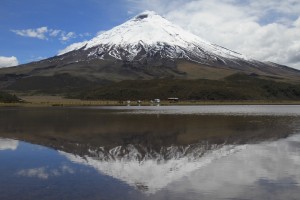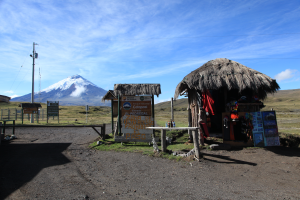 119 days after closing of the Cotopaxi National Park, government officials announced today, December 11th, 2015, the reopening of the protected area to visitors.
119 days after closing of the Cotopaxi National Park, government officials announced today, December 11th, 2015, the reopening of the protected area to visitors.
The decision is based on monitoring reports and follow up by the Geophysical Institute of the Escuela Politécnica Nacional (IGEPN) which demonstrate a decrease in volcanic activity in the last few weeks in both internal and surface. In addition, the Risk Management Secretariat (SGR) has recommended that while yellow alert is on, visits shall be accompanied by trained personnel.
The Ministry of Environment (MAE), along with the Risk Management Secretariat (SGR) and the Security Ministry (MICS) has worked to ensure the safety of all citizens who visit the Park, providing telecommunications equipment, related to the Early Alert System. MAE has also enhanced internal communication by providing portable radios to staff, which are linked directly to the Integrated Security Service ECU-911. With these equipments, timely warnings to rangers and visitors is ensured.
MAE also developed a contingency plan which include activities during the yellow alert. The plan starts from a diagnosis, vulnerabilities analysis and threats. It includes preventive actions, risk control such as: alarm and communications protocols, emergencies detection, and operational procedures for guards, technicians and administrators.
 The SGR and the Geophysical Institute (IGEPN) conducted a training program to rangers, protected area specialists and the administrator of Cotopaxi National Park. All these activities are linked to a communication plan for visitors; an informative brochure for mass distribution which has self-protection recommendations and a network communication plan in which all the institutions are part of monitoring, management and the safety of the Cotopaxi National Park.
The SGR and the Geophysical Institute (IGEPN) conducted a training program to rangers, protected area specialists and the administrator of Cotopaxi National Park. All these activities are linked to a communication plan for visitors; an informative brochure for mass distribution which has self-protection recommendations and a network communication plan in which all the institutions are part of monitoring, management and the safety of the Cotopaxi National Park.
Is worth to mention that Cotopaxi, is one of the best-monitored volcanoes in Latin America, recognized by the United States Geological Survey and NOVAC Project, responsible for the observation of volcanic and atmospheric changes in the world. However, the Ecuadorian Government have improved the volcanic monitoring system. Evidence of this is the provision of technological equipment that reinforces the current monitoring network, which operates 365 days a year and supports the Early Warning System. Among them: 16 seismic stations, 5 infrasound detectors, 13 lahars detectors, 7 video telemetry stations, 1 thermal imaging camera, 12 deformation control lines, 5 inclinometers, 5 GPS stations, 5 gas monitoring stations, 1 multi-gas mobile, Ash meters and 10 repeaters.
No monitoring system in the world can predict the date and time of a volcanic eruption, but it helps to set up security and prevention protocols.
Once safe conditions have been verified, high-tech instruments have been implemented and trained personnel is available, officials decided to reopen El Boliche Recreation Area and Cotopaxi National Park. In the latter, a new safe visit route was opened, which starts at Caspi Station, located on the south entrance ( from the Panamericana, Quito-Latacunga), to the North Station located in El Pedregal, in Machachi.
The opening hours are: from 09h00 to 14h00. Evacuation routes inside the National Park are from these two points. There are two lahars free safe sites: La Rinconada and Limpiopungo Lagoon Route. It is important to consider that the opening of the Park is partial and access to shelter or climbing to the crater is not allowed.
The Park´s surroundings have not been neglected. The Ministry of Tourism of Ecuador has worked with 43 technicians in the construction of contingency plans for 12 hotel establishments and five communities, closest to the risk area. Additionally, with the support of Tena and Mejia Municipalities, 23 representatives of tour operators were trained on topics related to volcanic activity, rescue and first aid.
All the above evidence shows that the coordinated efforts of public institutions have allowed the reopening of the Park, ensuring the safety of visitors, despite that the eruption process of Cotopaxi volcano continues.
